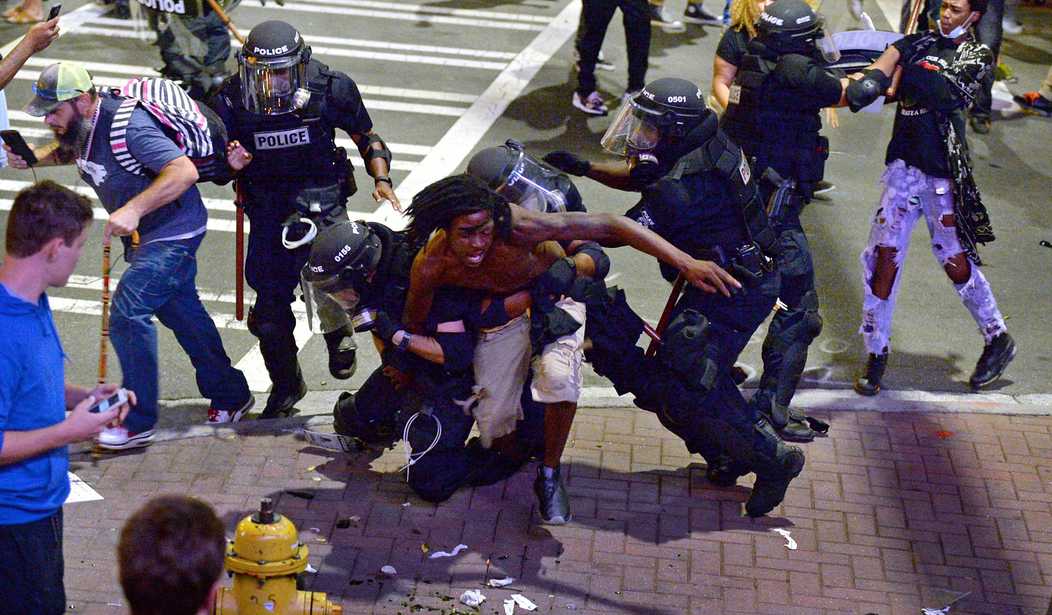One week after the police shooting of Keith Scott in Charlotte, North Carolina, the narrative has taken quite a turn.
The immediate story was that Scott, 43, was reading a book in his car when a police officer gunned him down in cold blood. The wife of Mr. Scott, Rakeyia Scott, along with racial-grievance activists claimed he was unarmed and “non-aggressive.” Some suggested the gun found at the scene had been planted. Charlotte had several nights of unrest, with rioting and property damage. One protestor was even shot and killed by another.
But new information casts serious doubt on the original story. Scott’s wife can be heard on a video she released telling the police that her husband doesn’t have a gun. The police can be heard on her video recording repeatedly telling Scott to “drop the gun.” Law enforcement released video from the dash cam of the police car that showed Scott didn’t raise his hands before he was shot, and the police audio also shows that police yelled at Scott to drop the gun at least ten times. The gun and holster found at the scene had Scott’s fingerprints and DNA on them. The book Scott was allegedly reading before he was shot and killed was not recovered at the scene.
But Mrs. Scott knew her husband did have a gun. According to papers filed last year by Scott’s wife, he threatened to kill her and his family with it.
Rakeyia Scott sought a domestic violence protective order against her husband on Oct. 5, 2015, in Gaston County, North Carolina, according to a copy of the document posted online by Time Warner Cable News on Tuesday.
She said in a motion for the order of protection that days earlier the father of seven had hit their 8-year-old son in the head and kicked her. On Oct. 4, he threatened to kill them, she said.
“He said he is a ‘killer’ and we should know that,” she said in court documents. In those documents, she said that Keith Scott worked as a security officer at a local mall and carried a 9 mm handgun.
Rakeyia Scott filed for a voluntary dismissal of the order on October 16, 2015, claiming he was no longer a threat to his family.
Scott’s gun was reportedly stolen during a burglary, according to WBTV.
Multiple sources confirmed to WBTV Monday that the gun police say was found in Keith Lamont Scott’s possession when he was fatally shot by a Charlotte-Mecklenburg Police (CMPD) officer was reported stolen.
The gun, sources said, was reportedly stolen in a residential breaking and entering. The sources said the man accused of stealing the gun was interviewed and is on record stating he sold the gun to Scott.
The police say they noticed Mr. Scott when he pulled up next to their unmarked squad car that was at the location to serve a warrant on another person. They observed he began to prepare a marijuana joint.
“Officers did not consider Mr. Scott’s drug activity to be a priority at the time and they resumed the warrant operation,” the police press release states. “A short time later, Officer Vinson observed Mr. Scott hold a gun up.”
“Due to the combination of illegal drugs and the gun Mr. Scott had in his possession, officers decided to take enforcement action for public safety concerns,” the release continued. “Officers departed the immediate area to outfit themselves with marked duty vests and equipment that would clearly identify them as police officers.”
WBTV describes:
When they returned, the report states, officers saw Scott in possession of a gun for the second time. The officers then identified themselves as police officers and “gave clear, loud and repeated verbal commands to drop the gun.” They said Scott refused to follow those commands.
That’s when an officer in uniform and in a marked vehicle arrived to assist, and “utilized his baton to attempt to breach the front passenger window in an effort to arrest” Scott. This is the vehicle police said the dash-cam video was recorded from.
The release states Scott then got out of the vehicle with the gun and “backed away from the vehicle while continuing to ignore officers’ repeated loud verbal commands to drop the gun.”
Scott had a history of questionable activity with a firearm.
A public records search shows that Scott was convicted in April 2004 of a misdemeanor assault with a deadly weapon charge in Mecklenburg County. Other charges stemming from that date were dismissed: felony assault with a deadly weapon with intent to kill, and misdemeanors assault on a child under 12, assault on a female and communicating threats.
In April 2015 in Gaston County Court, Scott was found guilty of driving while intoxicated.
In 1992, Scott was charged in Charleston County, S.C., with several different crimes on different dates, including carrying a concealed weapon (not a gun), simple assault and contributing to the delinquency of a minor. He pleaded guilty to all charges.
Scott also was charged with aggravated assault in 1992 and assault with intent to kill in 1995. Both charges were reduced, but the disposition of the cases is unclear.
According to Bexar County, Texas, records, Scott was sentenced in March 2005 to 15 months in a state jail for evading arrest. In July of that year, records show, he was sentenced to seven years in prison on a conviction of aggravated assault with a deadly weapon. A Texas Department of Criminal Justice spokesman said Scott completed his sentence and was released from prison in 2011.
An attorney for the family said that Scott’s history doesn’t have anything to do with whether the shooting was justified.
“What matters is what happened in those moments leading up to the trigger being pulled,” attorney Justin Bamberg said. “Mr. Scott was non-aggressive, had his hands by his side, appeared confused and, at the moment he was shot and killed, he was walking backwards. That’s what matters.”
“At the time that the shooting incident occurred, he was required to take numerous medications daily for both pain as well as cognitive ability,” Bamberg said. “His medication did affect him mentally.”
Why was he driving a car if his brain injury was that severe?
There is still much we don’t know about the incident and we may never get those answers, but it’s always best to wait for more information on these socially charged issues that are exploited to whip the public into a frenzy.









Join the conversation as a VIP Member